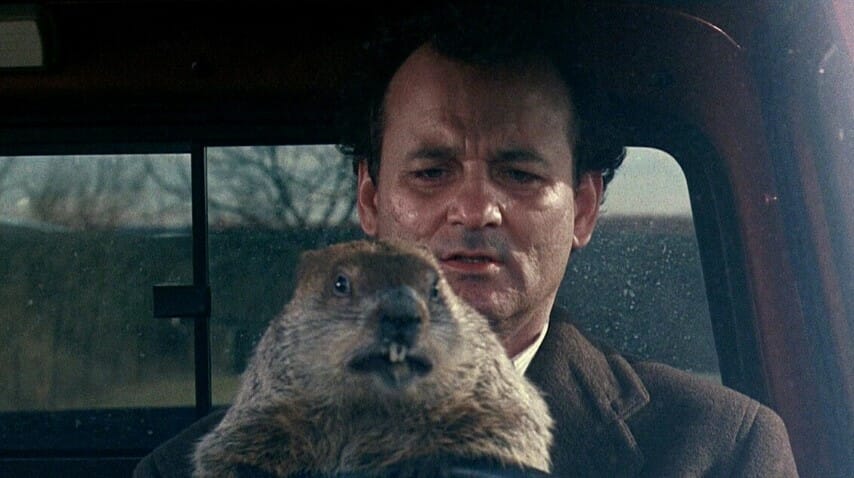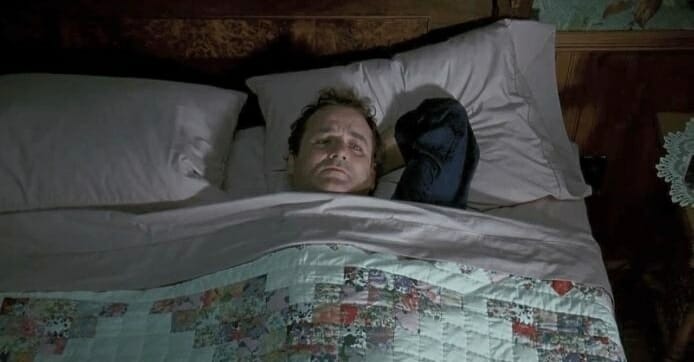Why Bill Murray’s Groundhog Day Is the Ultimate Quarantine Movie

If you’ve visited Paste’s list of the best feel-good movies on Netflix, or any of the similar lists no doubt being churned out by the internet publishing content machine as we all remain huddled in place during the ongoing coronavirus/COVID-19 pandemic, you’re likely to have spotted the presence of Groundhog Day. The 1993 Harold Ramis/Bill Murray comedic fantasy has attained the kind of mythic, permanent pop cultural status reserved for few films, seeming to grow in public esteem on an exponential, generational basis. What was only a modestly successful film at the box office in the era of Generation X became acknowledged as a classic by the time Millennials came of age, and in the streaming era of Gen Z the film has been more widely available and lauded than ever. It’s only natural it make appearances on lists of films you could watch to take your mind off the current cultural calamity.
Here’s the thing, though: Groundhog Day isn’t really the escapist fantasy one should be turning to for distraction from the pandemic headlines. Rather, it’s a truly apropos evocation of the exact same mental and emotional challenges that many of us are facing right now. It’s a movie that reflects the zeitgeist of our unexpected era of quarantine, even if it was never meant to do so. In fact, you could call Groundhog Day the ultimate quarantine movie.
Phil Connors, Hedonism and the Punxsutawney Quarantine
Bill Murray’s Phil Connors is never physically confined in Groundhog Day, except in the sense that he can’t escape the town because the approaching snowstorm shuts down all the interstates leading away from it. He is, however, confined from almost any other perspective you could adopt to view his situation. His resources are limited to whatever he can access in Punxsutawney, Pennsylvania, as are his social interactions. Want to physically be in the presence of someone not in that town? Too bad, not going to happen. The entire town becomes his quarantine zone, which perhaps doesn’t sound too bad at first … but wait until you’ve been living the same day there for more than 30 years, which is what the math seems to suggest. That mental and spiritual confinement is ultimately his greatest hurdle.
Phil’s first instinct when digesting this new normal, after the initial wave of panic, is toward hedonism and living without consequences—juvenile responses, because Phil is a very emotionally immature, self-centered man. He experiences what you might describe as a powerful rush of endorphins, knowing he can live outside “their rules” and effectively do whatever he wants, whether it’s breaking the law, unethically taking advantage of people or simply eating massive amounts of greasy diner food. He begins to think that perhaps his circumstances aren’t a curse; they’re a boon for him to live like a king and never have to worry about others again.
I know that this is certainly reflective of how my wife and I felt during early moments of our current quarantine state. There’s the brief initial period of worry and panic as the structures of everyday life are upended, but that active worry quickly gives way to an almost giddy sense of “well, I guess we’re staying home, so we can sort of do whatever we want, right?” The desire for escapism in this situation is strong, and so we too are all likely to turn to hedonism. If you’re trapped at home, how have you been spending your days? Playing videogames for hours on end, perhaps? Binging those TV sitcoms you always wanted to plow through? Eating copious amounts of junk food and takeout? Walking around, perpetually in your underwear? It can all make it easier to ignore the outside world, at least for a while.
A lifestyle of casual hedonism, however, has a tendency to ultimately lead to spiritual emptiness. For Phil in Groundhog’s Day, it doesn’t take him long to exhaust the resources and experiences he initially wants to have in Punxsutawney, leaving him despondent and eventually suicidal. After all, he’s seen literally everything there is to see on TV that day, as illustrated by the Jeopardy game where he knows every answer. He’s apparently seen the one movie in the local theater on 100 different occasions. He’s casually slept his way around with the local women, and has grown to resent not only them, but his own base instincts. He’s not just bored; he’s painfully unfulfilled. At first, he channels that intense energy into courting Rita, but when it becomes clear he’s not going to succeed he finally bottoms out, accepting that he needs to find new meaning in his quarantined life.
 When gratification is no longer gratifying.
When gratification is no longer gratifying.
-

-

-

-

-

-

-

-

-

-

-

-

-

-

-

-

-

-

-

-

-

-

-

-

-

-

-

-

-

-

-

-

-

-

-

-

-

-

-

-








































